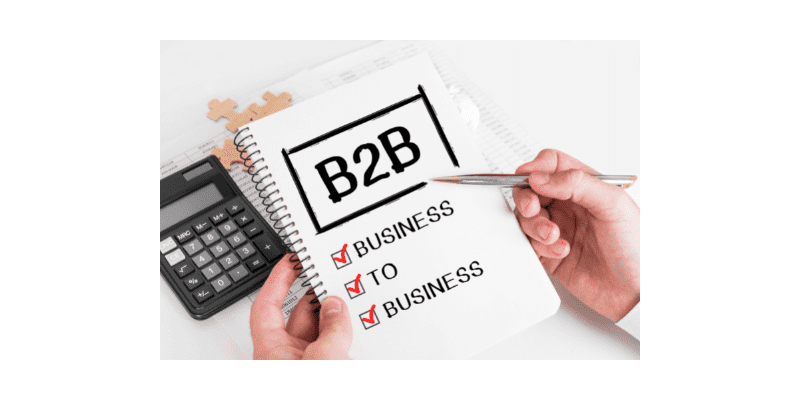If you’re a business-to-business (B2B) writer, you know that there’s a big difference between writing copy for consumers (b2c) and writing copy for other businesses. Crafting an effective B2B strategy can be tricky, but it’s worth the effort!
In this post, we’ll cover B2B writing basics. We’ll also explore some of the great strategies for success in creating winning B2B content. You’ll also learn what it takes to get into the B2B writing field.
What is B2B writing?
Business-to-business (B2B) writing is a type of writing that focuses on creating content for other businesses. This can include everything from creating marketing materials to writing proposals and business plans. Other types of B2B copywriting that businesses use are blog posts, white papers, brand collateral, and product descriptions.
Much like B2C writers (business to consumers), B2B writers need to be able to understand the needs of their clients and create content that is both informative and persuasive.
In many cases, B2B writers also need to have a strong understanding of the products or services that their clients offer. As a result, B2B writing can be highly specialized and requires both creative and analytical thinking. However, the rewards can be great for those who are able to successfully navigate the world of B2B writing.
Types of B2B Content Writing
There are many different types of b2b content writing, each with its own purpose and audience. Some common types of b2b content writing include website copy, blog posts, case studies, ebooks, and whitepapers.
- Website copy is the text that appears on a company’s website and is typically used to sell products or services.
- Blog posts are articles that are published on a company’s blog and are usually used to provide valuable information or insights.
- Case studies are detailed descriptions of how a company has helped solve a problem for a customer. They often include statistics and testimonials to illustrate the results.
- Product descriptions can include important content on the product page.
- Ebooks are long-form content pieces that are used to educate readers about a particular topic.
- Whitepapers are similar to ebooks but tend to be more research-oriented.
- Tech reports cover the technology the business is involved in and can explain the benefits.
- Emails –these could be customer support campaigns or newsletters
No matter what type of b2b content you’re creating, it’s important to keep your target audience in mind. What type of information do they need? What would persuade them to act? By understanding the needs of your target audience, you can create b2b content that is both engaging and effective.

Becoming a B2B writer
B2B writing tends to be more technical and information-heavy than other types of writing. If you’re interested in getting started as a B2B writer, there are a few things you should keep in mind.
- First, you should be skilled at doing research. Your content needs to be fact-based in order to please your B2B clients.
- It’s also important to have a strong understanding of digital marketing principles. You should know how to identify the needs of your target audience and craft B2B content that will resonate with them.
- It helps to be to have good copywriting skills to provide good sales copy! Being persuasive will directly affect how businesses will benefit if they invest in the products and services being offered.
- Additionally, it’s helpful to have experience with different types of content. This will give you the skills you need to put words together into convincing, high-quality marketing materials.
- Finally, don’t forget that businesses are always looking for ways to save time and money! As a B2B writer, it’s your job to show them how your products or services can help them meet their bottom line.
By keeping these things in mind, you’ll be well on your way to success as an expert B2B writer!

What skills are necessary to write for B2B companies
- First and foremost, a good B2B writer needs to understand the products or services that their client offers and be able to articulate the unique selling points in clear, concise language.
- They also need to understand their client’s target market and produce content that speaks directly to that market.
- A good B2B writer needs to be able to keep up with the latest trends in their industry and incorporate those trends into their writing.
- Additionally, B2B writers need to be well-versed in the language of their target audience. They should know the right terms and jargon to use in order to ensure that their writing is both relatable and informative.
Other skills
- B2B writers must be able to effectively communicate with different stakeholders within their company. This includes being able to understand the needs of each department and tailoring their writing accordingly.
- Also, a B2B writer must have a keen understanding of the competition. They need to be able to position the company’s product or service in a way that sets it apart from the competition.
- Finally, a B2B writer must be able to build relationships with their clients. They need to understand and cater to their needs.
If you have these essential skills, you may have what it takes to be a successful B2B writer!
How to write excellent B2B marketing content
First, it’s important to understand the needs and concerns of your target audience. What pain points are they trying to address? What are their goals?
As a business-to-business (B2B) writer, you have the unique challenge of creating marketing content that will resonate with your audience of other businesses. While the principles of effective writing still apply, there are some specific considerations to keep in mind when crafting B2B marketing content.
One of the most important things to keep in mind when writing B2B marketing content is that your audience is made up of busy professionals who are looking for solutions to their problems.
As such, you need to make sure that your content is laser-focused and relevant to their needs.
Audiences different than B2C
Second, remember that B2B audiences are often more skeptical than general consumers. They need to see concrete evidence that your product or service can deliver on its promises. This is where case studies and other data-driven content can be very effective. Showing potential customers how you have helped others in their industry achieve success can go a long way toward winning them over.
Another key tip for writing excellent B2B marketing content is to keep it concise and easy to read. Remember, your audience doesn’t have time to wade through pages and pages of dense text.
So, make sure you get to the point quickly and use short, actionable sentences. Use bullet points numbered lists. and infographics where proper. Don’t hesitate to explain industry jargon in plain English.
Finally, keep in mind that B2B relationships are built on trust. Your marketing content should reflect this by being honest and transparent. Don’t make claims that you can’t back up and be upfront about any potential risks or challenges associated with your product or service.
If you can build trust with your audience, you’ll be well on your way to creating successful B2B marketing content.

3 ways to effectively reach B2B audiences
- One of the most important things to keep in mind when writing B2B copy is that you’re not just talking to one person, but rather a group of people with different roles within an organization. As such, it’s important to address the needs of each decision-maker in your audience. For instance, if you’re selling software, you’ll need to address the needs of both the IT department and the company’s end users.
- It’s also important to be aware of the level of familiarity your reader has with your brand or product. If you’re writing for an audience that is already familiar with what you’re offering, then you can be more direct in your approach. However, if you’re targeting a cold audience that knows nothing about your brand, you’ll need to take a more educational approach in order to introduce them to what you are promoting.
- Finally, remember that B2B writing is all about creating persuasive content that will convince your reader to take some kind of action. Use your best copywriting skills to achieve this goal!
Whether you’re looking to increase brand awareness or drive conversions, following these tips will help you create content that gets results.
How to become a B2B writer
If you’re interested in becoming a B2B writer, the first step is to assess your skills and experience. Do you have what it takes to research complex topics and write clear and concise copy? If so, then B2B writing could be the right career path for you. Once you’ve decided that you have the right skill set, the next step is to start networking with other business professionals.
Attend industry events, join relevant online communities, and connect with potential clients on social media. By building a strong network, you’ll be able to position yourself as a credible B2B writer who can help businesses achieve their goals.

Steps to get started:
B2B writing is a lucrative and challenging field that can be immensely rewarding. To be a B2B writer, you need to have a deep understanding of your B2B clients and their needs. Here are three strategies to help you get started:
- Get to know your B2B clients. What industries are they in? What are their specific needs? What challenges do they face? The more you know about your B2B clients, the better equipped you will be to write compelling copy that speaks to their needs.
- Do your research. B2B writing requires a high level of understanding of complex topics. Before you start writing, make sure you do your research and understand the topic inside and out. This will allow you to write confidently and persuasively about even the most technical subjects.
- Find your niche. B2B writing is a vast field, and there are many sub-niches within it. Choose one that interests you. This will not only make the writing process more enjoyable, but it will also make you a more authoritative voice in your chosen field.
By following these three strategies, you can position yourself as a successful B2B writer who is able to command high rates for your work.
Common B2B writing niches:
- Healthcare
- Manufacturing
- Technology
- Education
- Transportation
- Finance
- Banking
- Law
- Energy
Common B2B writing specialties:
- B2B technical writer
- B2B copywriter
- Content marketing writer
- Social media writer

B2B writing is a unique and important form of content marketing, one that can be extremely effective if done well. To write great B2B content, you need to have strong skills in research, organization, and communication.
With these skills, you can create valuable and engaging content that helps your business connect with its customers. What do you think makes for great b2b writing?

